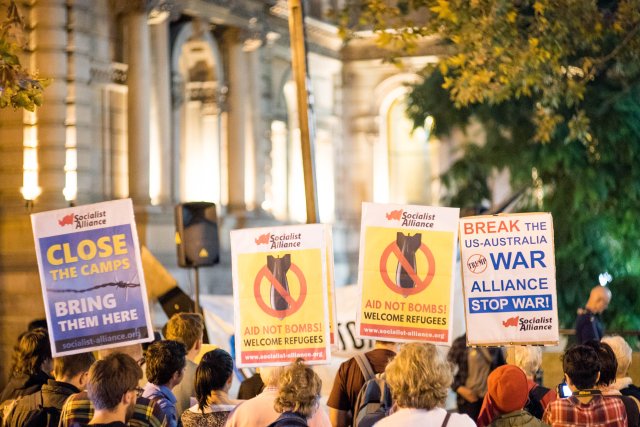
US President Donald Trump’s threat to unleash a new nuclear war should not be dismissed as the ravings of an unhinged individual. He may be that, but he has also shown that he is prepared to start a new war and ratchet up old ones.
The US’s missile attack on a Syrian government air base on April 7 and its decision to drop an 11-ton GBU-43/B (or MOAB, Mother Of All Bombs), the world’s biggest non-nuclear bomb, on Afghanistan on April 13 is proof of that.
Afghan democratic leader Malalai Joya called out Trump’s claim that the MOAB was targeting ISIS as a lie. She said that since 2001, the US has done more to help cultivate the spread of terrorist outfits such as ISIS and the Taliban than quell them. Sixteen years of US bombing has contributed to nurturing “this deadly virus”, she said.
But Trump is not just continuing with the US’s “permanent war”, which started with its invasion of Afghanistan in 2001 and its invasion and occupation of Iraq in 2003. He is raising the threat of bigger wars and in other parts of the globe.
The latest news reports quote Trump’s threatening to unleash a new hot war on North Korea as punishment for its continuing missile tests.
The US is pressing ahead with its militarisation of the Asia-Pacific region, with 400 US bases now encircling China — its main economic rival and a rising military power.
This is not a new US policy. Then-President Barrack Obama announced his “Pivot to Asia” in Canberra in 2011. This, the greatest build-up of US naval and air forces in the Asia-Pacific since World War II, is aimed at China. It includes stationing more bases and troops in Australia to maintain combat readiness and forward deployment of the Pacific Command in the Asia-Pacific region. It had domestic bipartisan support then as now.
What is new, and worrying, is Trump’s volatility, combined with his penchant for “shock and awe” tactics.
Far from being an isolationist, Trump is pushing ahead with military interventions. War, after all, is big business as General Smedley Butler said in the early 20th century. It is a convenient distraction, too, when Congress is divided over Trump’s domestic policies.
Not since the 1962 Cuban missile crisis, when the US threatened Cuba for seeking nuclear missile protection from the Soviet Union against another US attempt to overthrow its government after the failed Bay of Pigs invasion, has there been so much concern about the possibility of new, and possible, nuclear war.
Then, however, an agreement was reached between then-Soviet Premier Nikita Kruschev and US President John Kennedy to dismantle the Cuban missiles.
Secretly, the US dismantled its first nuclear tipped, medium-range ballistic missiles — designed to strike high-value targets such as bridges, railway yards and troop concentrations, which, unknown to the general public, had been deployed in Turkey and Italy against the Soviet Union.
The Cuban crisis erupted less than 20 years after the end of World War II, where nuclear weapons were used deliberately by the US to destroy Hiroshima and Nagasaki in Japan.
The devastation of whole cities has been repeated, including with chemical weapons in Afghanistan and Iraq.
The US threats against North Korea have come about because the isolationist North Korean state is trying to develop nuclear weapons. North Korea left the international non-proliferation treaty in 2003 and since 2006 has been subjected to US-supervised sanctions.
The nuclear non-proliferation treaty has little power over the US — the biggest proliferator of nuclear weapons — and countries with nuclear weapons which refuse to sign on, such as Israel and India.
We should oppose nuclear weapons and their development by any country, just as we should demand the US eliminate its massive nuclear stockpile and sign the 1996 Comprehensive Nuclear-Test-Ban Treaty, which would ban all nuclear explosions for both civilian and military purposes.
Nuclear powers China, Egypt, India, Iran, Israel, North Korea, Pakistan and the US have all refused to ratify this treaty.
A new US war, nuclear or conventional, with North Korea will be a disaster for the whole Korean Peninsula, as well as Japan and beyond.
Koreans are still paying the price for the Cold War-inspired war between North and South Korea in the early 1950s, which effectively stymied the Korean people’s desire for self-determination.
Trump’s new aggression towards North Korea is also aimed at sending a message to China, the US’s major rival militarily and economically. He wants to deliver a message that China must back the US in the region against North Korea, or face the consequences.
Any new war in this region, or elsewhere, needs to be strongly opposed.
Trump’s Vice President Mike Pence visited Australia to highlight the close relationship between the Pentagon and Australia’s compliant Coalition government and Labor opposition.
For the sake of humanity and the Earth, they must all be challenged. Trump may be the butt of comedian’s jokes now, but we could all die laughing.
Our opposition to war needs to escalate. We need to resuscitate the anti-war movement across Australia and demand an end to the US-Australia war alliance. This would include closing down the US spy bases, removing US troops; stepping up government aid to war-torn countries and welcoming refugees fleeing them.
[Pip Hinman is a member of Socialist Alliance.]
Like the article? Subscribe to Green Left now! You can also like us on Facebook and follow us on Twitter.